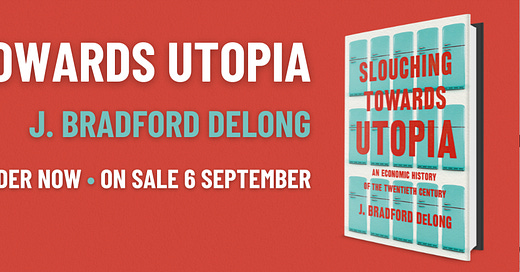¶ 2: Introduction: My Grand Narrative: Slouching Towards Utopia: Notes & Long Notes
.I am starting to go through the manuscript of my forthcoming book, paragraph-by-paragraph, adding in the full notes that could not make it into the print version...
¶2: In between [1870 and 2010], things were marvelous and terrible, but by the standards of all of the rest of human history much more marvelous than terrible.[e] The one-hundred and forty years 1870-2010 of the long twentieth century were, I strongly believe, the most consequential years of all humanity’s centuries.[f] And it was the first century in which the most important historical thread was what anyone would call the economic one, for it was the century that saw us end our near-universal dire material poverty.[g]
Longer Notes:
[e] Here we have my first claim about the history of the long 20th century: that, both compared to all past centuries and on an absolute scale, the history of the long 20th century was indeed, as Eric Hobsbawm says, the history of an Age of Extremes—but those extremes were much much much more marvelous than terrible. The arc of long 20th-century history was, by and large and broadly, with many hesitations, backward slippages, and complications, toward not justice but at least toward hope, hope for someday a truly human world.
[f] Here is my second claim: that the long 20th century was the most consequential century in humanity’s history, ever. Why? Because back in 1870 humanity was still desperately poor. Now some of us are very rich—the upper-middle classes of the global north are rich beyond the most fabulous dreams of luxury dreamed by previous ages. And most of us are, by the standards of all previous centuries, very comfortable and long-lived indeed. And that all of us are not so is a great scandal.
[g] Here is my third claim: That in the long 20th century, for the very first time in human history, the principal axis of history was economic—rather than cultural, ideological, religious, political, military-imperial, or what have you. Why was the long 20th century the first such century in which history was predominantly economic? Because before 1870 the economy was changing only slowly, too slowly for people's lives at the end of a century to be that materially different from how they had been at the beginning. So the economy was thus the painted-scene backdrop behind the stage, rather than the action on the stage. (Now do note that you can still say that the principal axis of any millennium's history is economic, for over millennia things do change.)
But back up: what I have said here simply establishes that the principal axis of the history of the long 20th century could have been economic—that the economy was changing and that enough economic damn things were happening one after the other to make it a player in history. But was it a lead actor? One of the major themes of my book is going to be: Yes, it was the lead actor. I am going to try to demonstrate this. But I am aware that that is a very shaky and debatable point. For example, I have a more-than-half-serious from Robert Kaufman about my prioritizing the social being of the modern economy over the social consciousness of modernity:
Where is Delong's discussion, at every one of the book's crucial turning points, of the relation of the poetic (and related literary) base to the economic superstructure???? From Aristotle to Smith to Ricardo to Marx to K. Polanyi (among the dead), and to Piketty (among the living), the groans in response to advance copies of Delong's long-awaited opus are deafening: “How could Brad have so misunderstood the causality running from the imaginative-aesthetic realm to that of the socio-economic?”






